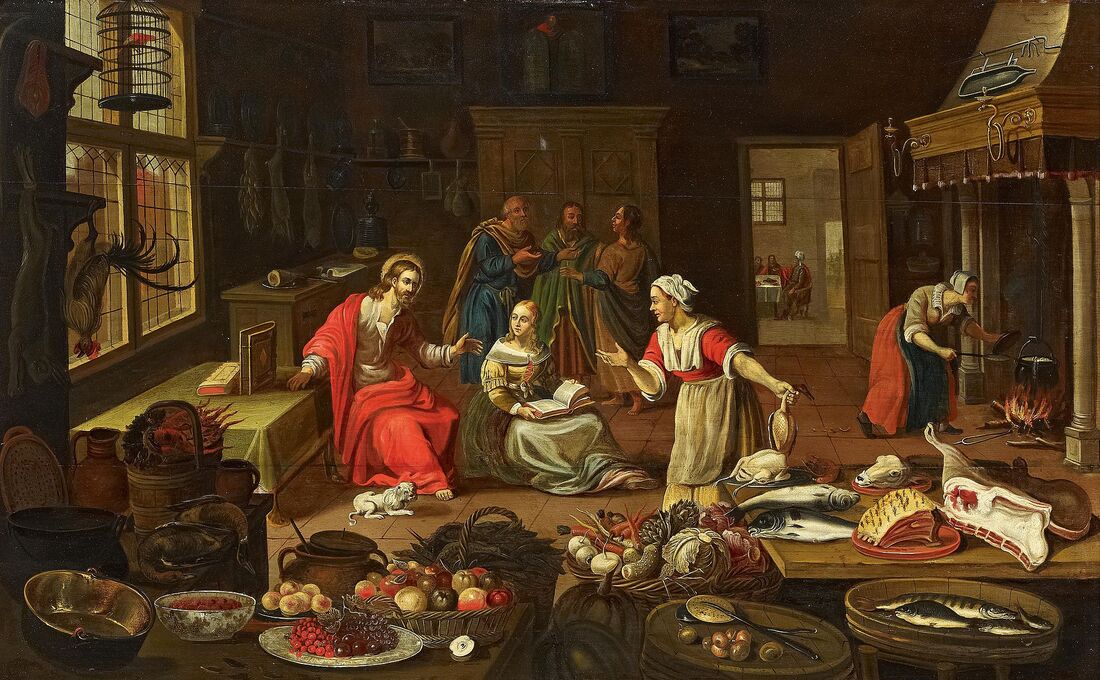|
Moving on through Part 3 of The Lord, Guardini devotes all of chapter seven to meditate on the people closest to Jesus. Not his disciples, but his friends: Lazarus, and his sisters Martha and Mary. It’s Mary and Martha who are the most interesting, in my mind. Recall the story (Luke 10:38-42): Jesus comes to visit the home of Mary and Martha. Martha is quick to lay out food and all manners of hospitality for her guest. But while she is incredibly busy trying to make sure Jesus feels welcome, Mary merely sits at his feet and listens to what he has to say. Martha gets cross, and asks Jesus if he thinks Mary ought to be pulling her weight around the house a bit. Jesus replies quite plainly: you are so full of worry about your guests’ comfort that you are allowing yourself to be distracted from what matters. “Mary has chosen the better part, which will not be taken away from her.” It’s quite clear from this story that Jesus is not a stranger to this home. Martha is a good hostess, and wouldn’t dream of being so direct with a stranger. She speaks to Jesus as if he is an old friend, and Jesus responds in kind. Jesus points out the difference between Martha, the eager one, and Mary, the reverent one. This isn’t the only time we see Mary and Martha being played against one another like this. After Lazarus dies, and Jesus comes with his disciples to raise him from the dead, Martha is the first to greet him (John 11:1-44). She believes in Jesus, and so the first thing to come out of her mouth is “If you had been here, Lazarus never would have died.” She certainly has faith, but might be a bit impulsive. She also calls her sister Mary out to meet with Jesus. There is no ill will between them, she knows Jesus loves Mary and she is happy to bring them back together again. Mary doesn’t say a word, but merely weeps at his feet. When Jesus goes to raise Lazarus, Mary remains silent while Martha expresses worry about the smell, as Lazarus has been dead for days. Again we see Martha always ready with an answer, ready to spring into action. Martha looks outward, while Mary’s focus is inward. And again, when Jesus visits the risen Lazarus and his two sisters, we see it again (John 12:1-8). Martha is busy serving, eager to make her guests comfortable. Mary, on the other hand, chooses to spend her time anointing Jesus with the finest perfume. This upsets Judas, of course, because he would prefer to sell it so he can skim some of the profits. But that’s another concern. Our attention here is on Mary and Martha. Martha is always busy with things going on around her, with the practical. Mary only ever acts from the heart. Guardini points out the tension that exists between these two. It is not a hostile tension, as we see from the raising of Lazarus that Martha loves Mary very dearly. The two of them seem to balance each other out. Mary, so fixated on the things of the heart that she never seems to get anything done, and Martha, so focused on doing things that she forgets to stop and experience the important things. These two women reflect the two fundamental tension that exists within all of us: the external existence and the internal existence. Both are important, and both are essential to who we are as human beings. But as Guardini says, one is primary. The internal is most important, as it is from the heart that all things flow. He uses the analogy of a tree: “If the leaves are taken from a tree, its roots do not save it from suffocation. Both are part of life, but the inner part is the decisive one.” In other words, Martha is not wrong. Martha is a loving soul, and cares deeply for her sister, brother, and her friend Jesus. But she is too easily distracted. She needs her sister to help her focus her efforts. Mary thinks purely from the heart. With Mary and Martha side-by-side, Mary providing the guiding direction, they are in perfect tension.
So the question is, how is that tension in me? Is it properly ordered, in a perfect tension where my inner existence guides and directs my outer existence? Or is that tension strained to the point of breaking, where my outer life is so busy going about its own business that my inner life is ignored? If the leaves carry on without the roots, both will wither away and die. The inner and the outer must exist together.
0 Comments
|
Series Info
Every day of Lent, I am writing a reflection piece on two chapters of "The Lord" by Romano Guardini. If you'd like to read or follow along, you can find the full calendar of where we're at below, or Click Here for the main landing page. Archives
April 2020
Categories
All
|

 RSS Feed
RSS Feed